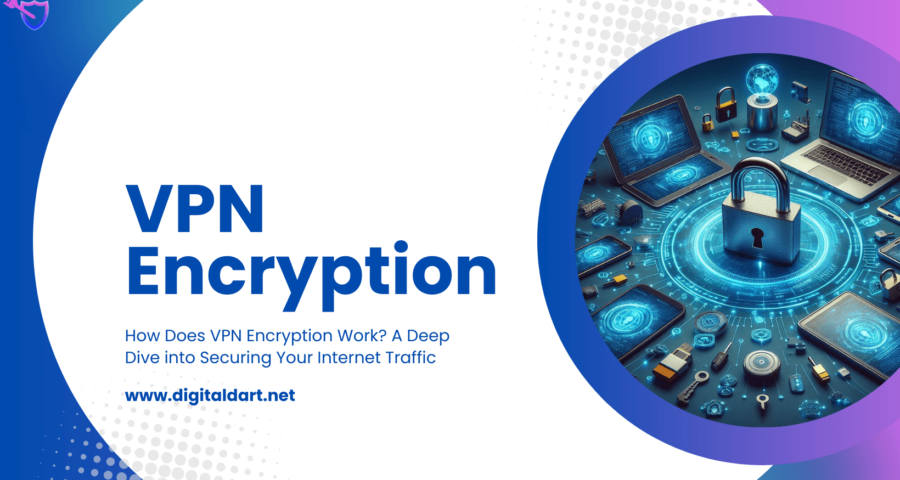In today’s digital age, where privacy and security are paramount concerns, understanding how VPN encryption works is crucial for safeguarding your online activities. VPN encryption acts as a shield, protecting your sensitive data from prying eyes and cyber threats. In this comprehensive guide, we’ll delve into the intricacies of VPN encryption, exploring its mechanisms, types, protocols, and the role of VPN providers in ensuring robust security.
Understanding VPN Encryption
What is VPN encryption?
VPN encryption involves scrambling your internet traffic data, making it unreadable to anyone attempting to intercept it. This process ensures that your online communications remain secure and private. Essentially, Encryption creates a secure tunnel between your device and the VPN server, safeguarding your data from potential eavesdroppers.
How does VPN encryption work?
It operates through complex algorithms that encode your data into an unreadable format before it’s transmitted over the internet. This encrypted data is then decrypted by the VPN server and forwarded to its destination. Encryption keys play a vital role in this process, as they’re used to encode and decode the data, ensuring secure transmission.
Benefits of VPN encryption
- Protection against cyber threats: Encryption shields your data from hackers, malicious entities, and surveillance activities, reducing the risk of data breaches and cyber attacks.
- Privacy enhancement: By encrypting your internet traffic, VPNs conceal your online activities from ISPs, governments, and other entities seeking to monitor or track your online behavior.
- Bypassing geo-restrictions: Encryption allows you to circumvent geographic restrictions and access geo-blocked content or services, expanding your online freedom and accessibility.
Types of VPN Protocols and Encryption Levels
Common VPN protocols
- OpenVPN: Known for its robust security and flexibility, OpenVPN is widely used across various platforms and devices, offering strong encryption and reliable performance.
- L2TP/IPsec: Layer 2 Tunneling Protocol (L2TP) combined with IPsec provides enhanced security and authentication features, making it suitable for protecting sensitive data.
- IKEv2/IPsec: IKEv2 (Internet Key Exchange version 2) with IPsec offers seamless connectivity and efficient encryption, ideal for mobile devices and fast-paced networks.
Comparison of encryption levels
Each VPN protocol employs different encryption algorithms and key lengths, affecting their overall security and performance. Factors such as encryption strength, authentication methods, and compatibility should be considered when selecting a VPN protocol that meets your security requirements.
Encryption Algorithms Used in VPNs
Overview of popular encryption algorithms
- AES (Advanced Encryption Standard): Widely regarded as the gold standard of encryption, AES ensures high levels of security and efficiency, with key lengths ranging from 128 to 256 bits.
- RSA (Rivest-Shamir-Adleman): RSA encryption is commonly used for key exchange and digital signatures, facilitating secure communication between VPN clients and servers.
- Diffie-Hellman key exchange: This cryptographic protocol enables two parties to establish a shared secret key over an insecure channel, ensuring secure data transmission in VPN connections.
How encryption algorithms ensure security
Encryption algorithms play a critical role in safeguarding VPN communications by transforming plaintext data into ciphertext, which is indecipherable without the corresponding decryption key. The strength of encryption algorithms, combined with robust authentication mechanisms, helps mitigate security risks and protect against unauthorized access or interception.
The Role of VPN Providers in Encryption
Responsibilities of VPN providers in maintaining encryption standards
VPN providers are tasked with implementing and maintaining robust encryption protocols to ensure the confidentiality, integrity, and authenticity of user data. This includes regularly updating encryption algorithms, adhering to strict security practices, and safeguarding user privacy through transparent policies and procedures.
Factors to consider when choosing a VPN provider
- Reputation and trustworthiness: Select a reputable VPN provider with a proven track record of prioritizing user privacy and security.
- Protocols and algorithm support: Choose a service that offers a wide range of encryption protocols and supports strong encryption algorithms, such as AES-256.
- Logging policies and data protection measures: Review the provider’s logging policies and data handling practices to ensure your privacy is respected and protected.
Potential Vulnerabilities and Mitigation Strategies
Common vulnerabilities
- DNS leaks: Encryption may be compromised if DNS requests leak outside the encrypted tunnel, potentially revealing your browsing activities to third parties.
- IP leaks: Similarly, IP address leaks can occur if the VPN connection fails to mask your true IP address, exposing your identity and location to adversaries.
Strategies to mitigate vulnerabilities
- DNS leak protection: Enable DNS leak protection features offered by your VPN provider to prevent DNS requests from bypassing the encrypted tunnel.
- Kill switch feature: Utilize a kill switch feature that automatically terminates internet traffic if the VPN connection drops, preventing data leaks and exposure.
- Regular software updates and patches: Stay vigilant and ensure your VPN client software is up-to-date with the latest security patches and enhancements to mitigate potential vulnerabilities and exploits.
Conclusion
In conclusion, Encryption serves as a critical safeguard for securing your internet traffic and protecting your online privacy. By understanding how it works, selecting the right VPN protocols and encryption algorithms, and choosing a reputable VPN provider, you can enhance your digital security posture and enjoy a safer online experience. Take proactive steps to fortify your online defenses and safeguard your sensitive data with the help of Digital Dart VPN services.
Secure Your Online Privacy with Digital Dart VPN Today!
With Digital Dart VPN, you can enjoy robust encryption, reliable performance, and uncompromising privacy protection for all your online activities. Don’t compromise on your digital security – choose Digital Dart VPN and take control of your online privacy today.


Leave a Reply